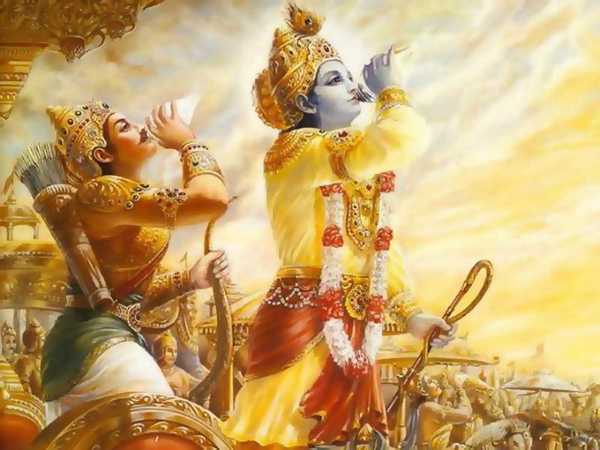Chapter 42

Vaisampayana said, “After the Lokapalas had gone away, Arjuna–thatslayer of all foes–began to think, O monarch, of the car of Indra! Andas Gudakesa gifted with great intelligence was thinking of it, the carendued with great effulgence and guided by Matali, came dividing theclouds and illuminating the firmament and filling the entire welkin withits rattle deep as the roar of mighty masses of clouds. Swords, andmissiles of terrible forms and maces of frightful description, and wingeddarts of celestials splendour and lightnings of the brightest effulgence,and thunderbolts, and propellors furnished with wheels and worked withatmosphere expansion and producing sounds loud as the roar of greatmasses of clouds, were on that car. And there were also on that carfierce and huge-bodied Nagas with fiery mouths, and heaps of stones whiteas the fleecy clouds. And the car was drawn by ten thousands of horses ofgolden hue, endued with the speed of the wind. And furnished with prowessof illusion, the car was drawn with such speed that the eye could hardlymark its progress. And Arjuna saw on that car the flag-staff calledVaijayanta, of blazing effulgence, resembling in hue the emerald or thedark-blue lotus, and decked with golden ornaments and straight as thebamboo. And beholding a charioteer decked in gold seated on that car, themighty-armed son of Pritha regarded it as belonging to the celestials.And while Arjuna was occupied with his thoughts regarding the car, thecharioteer Matali, bending himself after descending from the car,addressed him, saying, ‘O lucky son of Sakra! Sakra himself wisheth tosee thee. Ascend thou without loss of time this car that hath been sentby Indra. The chief of the immortals, thy father–that god of a hundredsacrifices–hath commanded me, saying, ‘Bring the son of Kunti hither.Let the gods behold him.’ And Sankara himself, surrounded by thecelestials and Rishis and Gandharvas and Apsaras, waiteth to behold thee.At the command of the chastiser of Paka, therefore, ascend thou with mefrom this to the region of the celestials. Thou wilt return afterobtaining weapons.'”
“Arjuna replied, ‘O Matali, mount thou without loss of time thisexcellent car, a car that cannot be attained even by hundreds of Rajasuyaand horse sacrifices. Even kings of great prosperity who have performedgreat sacrifices distinguished by large gifts (to Brahmanas), even godsand Danavas are not competent to ride this car. He that hath not asceticmerit is not competent to even see or touch this car, far less to ride onit. O blessed one, after thou hast ascended, it, and after the horseshave become still, I will ascend it, like a virtuous man stepping intothe high-road of honesty.'”
Vaisampayana continued, “Matali, the charioteer of Sakra, hearing thesewords of Arjuna, soon mounted the car and controlled the horses. Arjunathen, with a cheerful heart, purified himself by a bath in the Ganges.And the son of Kunti then duly repeated (inaudibly) his customaryprayers. He then, duly and according to the ordinance, gratified thePitris with oblations of water. And, lastly, he commenced to invoke theMandara–that king of mountains–saying, ‘O mountain, thou art ever therefuge of holy, heaven-seeking Munis of virtuous conduct and behaviour.It is through thy grace, O mountain, that Brahmanas and Kshatriyas andVaisyas attain heaven, and their anxieties gone, sport with thecelestials. O king of mountains, O mountain, thou art the asylum ofMunis, and thou holdest on thy breast numerous sacred shrines. Happilyhave I dwelt on thy heights. I leave thee now, bidding thee farewell. Ofthave I seen thy tablelands and bowers, thy springs and brooks, and thesacred shrines on thy breast. I have also eaten the savoury fruitsgrowing on thee, and have slated my thirst with draughts of perfumedwater oozing from the body. I have also drunk the water of thy springs,sweet as amrita itself. O mountain, as a child sleepeth happily on thelap of his father, so have I, O king of mountains, O excellent one,sported on thy breast, echoing with the notes of Apsaras and the chantingof the Vedas. O mountain, every day have I lived happily on thytablelands.’ Thus having bidden farewell to the mountain, that slayer ofhostile heroes–Arjuna–blazing like the Sun himself, ascended thecelestial car. And the Kuru prince gifted with great intelligence, with aglad heart, coursed through the firmament on that celestial car effulgentas the sun and of extra-ordinary achievements. And after he had becomeinvisible to the mortals of the earth, he beheld thousands of cars ofextra-ordinary beauty. And in that region there was no sun or moon orfire to give light, but it blazed in light of its own, generated byvirtue of ascetic merit. And those brilliant regions that are seen fromthe earth in the form of stars, like lamps (in the sky)–so small inconsequence of their distance, though very large–were beheld by the sonof Pandu, stationed in their respective places, full of beauty andeffulgence and blazing with splendour all their own. And there he beheldroyal sages crowned with ascetic success, and heroes who had yielded uptheir lives in battle, and those that had acquired heaven by theirascetic austerities, by hundreds upon hundreds. And there were alsoGandharvas, of bodies blazing like the sun, by thousands upon thousands,as also Guhyakas and Rishis and numerous tribes of Apsaras. And beholdingthose self-effulgent regions, Phalguna became filled with wonder, andmade enquiries of Matali. And Matali also gladly replied unto him,saying, ‘These, O son of Pritha, are virtuous persons stationed in theirrespective places. It is these whom thou hast seen, O exalted one, asstars, from the earth.’ Then Arjuna saw standing at the gates (Indra’sregion) the handsome and ever victorious elephant–Airavata–furnishedwith four tusks, and resembling the mountain of Kailasa with its summits.And coursing along that path of the Siddhas, that foremost of the Kurusand the son of Pandu, sat in beauty like Mandhata–that best of kings.Endued with eyes like lotus leaves, he passed through the region setapart for virtuous kings. And the celebrated Arjuna having thus passedthrough successive regions of heaven at last beheld Amaravati, the cityof Indra.”




